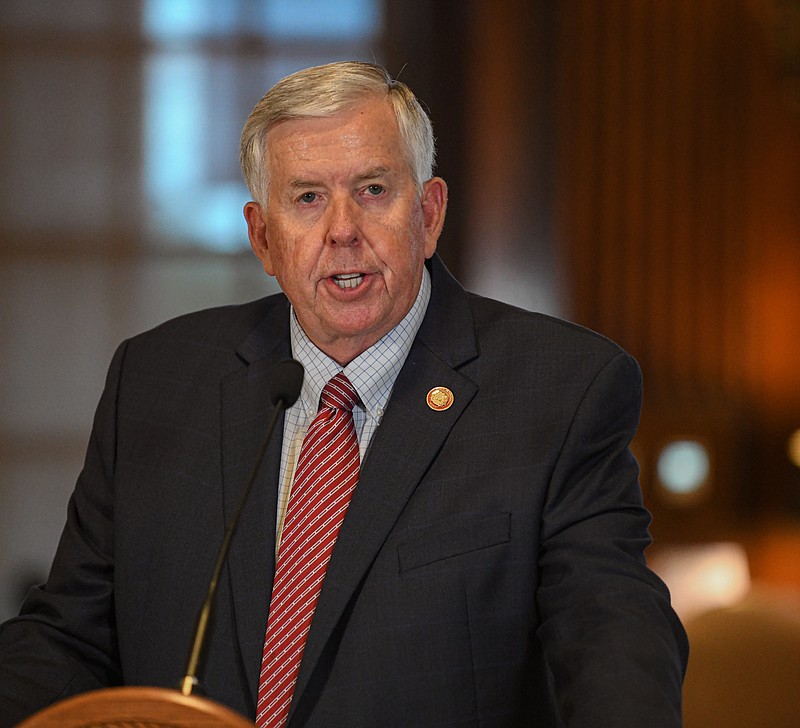Missouri Gov. Mike Parson is meeting with Republican lawmakers across the state to solidify a plan for making his tax cut dreams a reality during the upcoming special legislative session.
The Republican governor has proposed reducing the state income tax from 5.4 percent to 4.8 percent, among a host of other measures he said are aimed at simplifying the tax code. Parson vetoed a tax rebate program Missouri lawmakers passed earlier this year and called on them to pass permanent tax relief through a special session, the dates of which have not yet been set.
After speaking on the proposal in an address to the Springfield Area Chamber of Commerce on Aug. 2, he met with Republican legislators from southwest Missouri to lay the foundation. Parson followed that up by meeting with Mid-Missouri legislators the next day in Jefferson City.
In his address, Parson touted the plan as the largest tax cut in state history. With Missouri's income tax set at 5.8 percent when he assumed office, the governor has supported an overall 10 percent reduction in income tax.
In addition to the lower tax rate, the first $16,000 in earned income for single filers and $32,000 for joint filers wouldn't be taxed under Parson's plan. He's also calling for more tax deductions and allowances, fewer tax brackets and a more streamlined state tax code.
The governor has previously been hesitant to call a special session without a solid plan for the legislation in place.
Parson said he expects his tax plan to have bipartisan support and pass during the special session, noting it would benefit seniors, low income Missourians and the working class.
Reps. Dave Griffith, R-Jefferson City, and Rudy Veit, R-Wardsville, took part in the governor's closed meeting last week and are fully supportive of the tax cut plans.
"Everybody wants a tax cut, but you can't just give tax cuts unless they're well thought-out because we also have a government to run," Veit said. "And in talking to the governor, they did their study and the projection over growth is one that should not put us in a financial bind two or three years from now, or five years from now."
Griffith said the Governor's Office has been working to vet the tax cut proposal, which will drain approximately $700 million from the state.
"Some of my colleagues that were in the room thought maybe we should go to a lower amount," Griffith said. "But based on the Missouri economy and the numbers that we've had over the past three years, he feels like that would be sustainable moving forward into the future."
Triggers within Missouri's tax code -- which give Missourians a tax cut once they reach certain tax thresholds -- came under fire during the meetings, Griffith and Veit said.
Veit said Parson stressed his opposition to tax triggers. Veit is also opposed to them because he said it assumes the current Legislature is smarter than future generations of lawmakers.
"They can handle their financial affairs because they'll know everything surrounding them better than we can," he said.
Veit said he expects the tax cut and agricultural tax credit legislation to be paired together in one bill, removing the possibility of lawmakers supporting one measure but not the other.
On the agricultural tax credit front, Parson is suggesting extending the sunset of select agricultural tax programs from two years to six. Both Griffith and Veit said they were in support of that.
"I think it will pass in the House the way it's drafted," Veit said. "The Senate, that's anybody's prediction."
Parson vetoed another tax proposal carried by Republican lawmakers during the most recent legislative session, citing a rushed process and temporary product that left out vulnerable Missourians.
That bill, House Bill 2090, would have provided a one-time tax credit to Missourians who owed state taxes in 2021. According to the legislation, the credit was worth $500 for individuals making less than $150,000 per year and $1,000 for joint filers making less than $300,000 per year.
As Parson notes in his veto letter, however, the General Assembly didn't appropriate enough funding for the program so the maximum value of the credit was closer to $205-$410.
"This proposal does little to assist the state's lowest income individuals and families, including those on fixed incomes such as disabled individuals, retirees and social security recipients," Parson wrote in his veto letter. "I am committed to substantial tax relief for all Missourians. Unfortunately, House Bill 2090 does not achieve those goals and cannot be administered as currently provided for in this legislation and in the budget."
Griffith said he was disappointed when the governor vetoed the original tax rebate proposal but that the new plan is a good solution because it's permanent.
"It's one more step that we can take that we can really provide tax relief for everyone, not just the upper tax brackets, but everybody in general," he said.
Griffith said he believes legislators involved in creating the budget last session spent taxpayer funds wisely, and the state's funding for education, infrastructure and other areas was enough.
Veit said the record investments set the tone for the state to continue funding them.
"I think we're moving in the right direction," Griffith said.
Parson is discussing his tax cut plans with additional House Republicans from southeast Missouri and the St. Louis region today. He's following it up with a meeting for House and Senate Republicans from the northeastern part of the state Tuesday. On Wednesday, he's meeting Republican lawmakers from Kansas City and northwest Missouri, followed by an appearance at the House Summer Caucus in Branson on Friday.
The governor met with several state senators about the special session a few weeks ago.
Griffith said he expects the special session to be called sometime after Labor Day.

